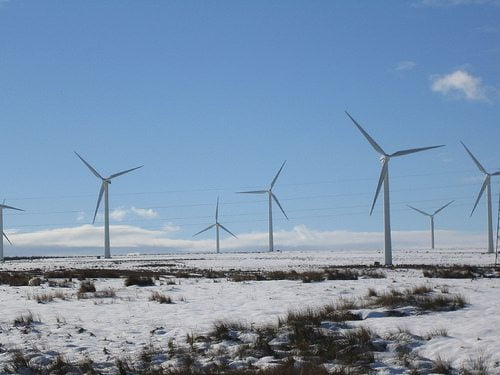

Energy
Electricity’s ‘Climate Impact’ reduced most in Scotland compared to UK
The average ‘climate change impact’ of generating a unit of electricity in Scotland has fallen by almost two-fifths (38%) between 2010 and 2014 (the most recent available figures) and is now half the UK average, according to new analysis by WWF Scotland of official government data.
WWF and others are now calling on the Scottish Government to now aim to repeat this significant achievement in the power sector across other sectors of energy use, including heat and transport.
WWF’s analysis found:
- The ‘climate change impact’ (measured as gCO2/kWh) of generating a unit of electricity in Scotland in 2014 was 196gCO2/kWh, compared to 400gCO2/kWh for the whole of the UK – a difference of 204gCO2/kWh (or 51%);
- The ‘climate change impact’ of generating a unit of electricity in Scotland fell from 318gCO2/kWh in 2010 to 196gCO2/kWh in 2014 – a decline of 122gCO2/kWh (or -38%); and
- The ‘climate change impact’ of generating a unit of electricity for the entire UK fell from 457gCO2/kWh in 2010 to 400gCO2/kWh in 2014 – a decline of 57gCO2/kWh (or -12%).
WWF Scotland’s Climate and Energy Policy Officer Fabrice Leveque, said:
“Thanks to the Scottish Government’s leadership on renewables policy, the climate change impact of producing electricity in Scotland has fallen rapidly and is now half that of the whole of the UK. The transformation in the way we produce our power is helping Scotland harness the many economic and social benefits of shifting to a zero-carbon future.
“But electricity accounts for just one quarter of our energy use, so if we’re to meet our future climate targets, the Scottish Government must build on the progress made in the electricity sector to set a 50 per cent renewables target for all our energy needs, across electricity, heat and transport sectors, by 2030.”
Star Renewable Energy director and low-carbon heat expert Dave Pearson said:
“With the climate change impact of generating electricity in Scotland now down below 200gCO2/kWh, highly efficient heat pumps will deliver heat for less than a third of the carbon of gas boilers. We need to stop installing gas boilers, if we are to start providing cheaper, cleaner heat. The Scottish Government should bring forward bold policies to make sure we are installing the right, future-proof technologies in our buildings.”
Transform Scotland director Colin Howden said:
“We need Scotland to repeat the success it’s had on cutting emissions in the power sector in other areas of society. When it comes to Scotland’s transport sector, climate emissions have barely declined from 1990 levels.
“Yet there is much that could be done. We need to level the playing field so that public transport, cycling and walking can compete with the private car, and have a long-term strategy that clearly shows how all transport will shift over to low-carbon.”


 Environment12 months ago
Environment12 months agoAre Polymer Banknotes: an Eco-Friendly Trend or a Groundswell?

 Features11 months ago
Features11 months agoEco-Friendly Cryptocurrencies: Sustainable Investment Choices

 Features12 months ago
Features12 months agoEco-Friendly Crypto Traders Must Find the Right Exchange

 Energy11 months ago
Energy11 months agoThe Growing Role of Solar Panels in Ireland’s Energy Future


























